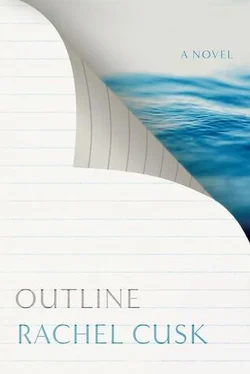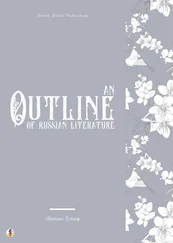The waiter loomed beside us carrying several dishes, and Paniotis broke off with a final pantomimed gesture of dismay, leaning back to let him put things on the table. There was a carafe of pale yellow wine, a dish of tiny green olives on their stalks that looked bitter but tasted sweet and delicious, and a plate of cold, delicate mussels in their black shells. To fortify us, Paniotis said, for the arrival of Angeliki. You will find that Angeliki has become very grand, he said, since one of her novels won some prize or another somewhere in Europe and she is now considered — or at least considers herself — to be a literary celebrity. Her sufferings — whatever they were — being over she has elected herself a sort of spokesperson for suffering womanhood generally, not just in Greece but in other territories that have demonstrated an interest in her work. Wherever she is asked to go, she goes. The novel, he said, concerns a woman painter whose artistic life is gradually being stifled by her domestic arrangements: her husband is a diplomat, and the family is always being uprooted and moved to a new place, so that the woman painter comes to feel that her own work is merely decorative, a pastime, while her husband’s is considered not just by him but by the world to be important, to forge events rather than simply provide a commentary on them, and that when there is a conflict between the two — which, this being a novel by Angeliki, there often is — his needs triumph over hers. And eventually her work starts to become mechanical, a pretence; there is no passion, yet her urge to express herself remains. In Berlin, where the family are now living, she meets a young man, a painter, who reignites her passion, for painting and for everything else — but now the problem is that she feels too old for this young man, and also she feels miserably guilty, especially about her children, who have sensed that something is wrong and have started to become upset. Most of all she feels angry with her husband, for putting her in this position, for causing her to lose her passion in the first place and leaving her entirely responsible for the consequences. And the young painter is still making her feel old, with his all-night parties and his recreational drugs and his wonder at the marks experience has left on her woman’s body. There is no one she can talk to, no one she can tell — what a lonely place, smirks Paniotis. That’s the title, by the way: A Lonely Place. My argument with Angeliki, he says, concerns her substitution of painting for writing, as if the two were interchangeable. The book is obviously about herself, he says, and yet she knows nothing at all about painting. In my experience painters are far less conventional than writers. Writers need to hide in bourgeois life like ticks need to hide in an animal’s fur: the deeper they’re buried the better. I don’t believe in her painter, he says, making the children’s packed lunches in her state-of-the-art German kitchen while fantasising about sex with a young muscled androgyne in a leather jacket.
I asked him what it was, in London, that had caused him to lose faith in his publishing house, which he had only just launched and which indeed shortly afterwards — I had heard — was taken over by a large corporation, so that Paniotis was now a company editor rather than the director of his own enterprise. My reverence for all things English, he said after a silence, his sorrowful eyes brimming and rolling in their sockets, was not reciprocated. This was when things had started to get difficult here, he continued, though no one guessed then how much worse they would become. The publishing house was to be devoted exclusively to translating and printing English-language authors unheard of in Greece, writers the commercial publishers wouldn’t touch, whose work Paniotis deeply admired and was determined to make available for his countrymen. But at a particular moment he was unable to provide the advance payments to these authors, many of whose books he had translated himself to cut costs. In London he found himself excoriated, even by the writers themselves, for non-payment of money that the books, strictly speaking, had not yet actually earned; he was treated with the greatest disdain by everyone, was threatened with legal action, and worst of all came away with the impression that these writers he had worshipped as the artists of our time were in fact cold and unempathetic people devoted to self-promotion and above all else, to money. He had made it quite clear to them that if he was forced to pay, his publishing house would collapse before it had even begun, which indeed is what happened; those same writers are regularly rejected by the company he works for now, who are interested only in turning out best-sellers. And so I learned, he said, that it is impossible to improve things, and that good people are just as responsible for it as bad, and that improvement itself is perhaps a mere personal fantasy, as lonely in its way as Angeliki’s lonely place. We are all addicted to it, he said, removing a single mussel from its shell with his trembling fingers and putting it in his mouth, the story of improvement, to the extent that it has commandeered our deepest sense of reality. It has even infected the novel, though perhaps now the novel is infecting us back again, so that we expect of our lives what we’ve come to expect of our books; but this sense of life as a progression is something I want no more of.
In his marriage, he now realised, the principle of progress was always at work, in the acquiring of houses, possessions, cars, the drive towards higher social status, more travel, a wider circle of friends, even the production of children felt like an obligatory calling-point on the mad journey; and it was inevitable, he now saw, that once there were no more things to add or improve on, no more goals to achieve or stages to pass through, the journey would seem to have run its course, and he and his wife would be beset by a great sense of futility and by the feeling of some malady, which was really only the feeling of stillness after a life of too much motion, such as sailors experience when they walk on dry land after too long at sea, but which to both of them signified that they were no longer in love. If only we had had the sense, he said, to make our peace with one another then, to start from the honest proposition that we were two people not in love who nonetheless meant one another no harm; well, he said, his eyes brimming again, if that had been the case I believe we might have learned truly to love one another and to love ourselves. But instead we saw it as another opportunity for progress, saw the journey unfolding once more, only this time it was a journey through destruction and war, for which both of us demonstrated just as much energy and aptitude as always.
These days, he said, I live very simply. In the mornings, at sunrise, I drive to a place I know twenty minutes outside Athens and I swim all the way across the bay and all the way back again. In the evenings I sit on my balcony and I write. He closed his eyes briefly and smiled. I asked him what it was he was writing, and his smile widened. He said, I am writing about my childhood. I was so happy as a child, he continued, and I realised a little while ago that there was nothing I wanted so much as to recall it piece by piece, with every possible detail. The world that happiness existed in has completely disappeared, not just in my own life but in Greece as a whole, for whether it knows it or not Greece is a country that is on its knees and dying a slow and agonising death. In my own case, I sometimes wonder whether it was the very happiness of my childhood that has meant I have had to be taught how to suffer. I seem to have been exceptionally slow to understand where pain comes from, and how it comes. It has taken me a long time to learn to avoid it. I read in the newspaper the other day, he said, about a boy with a curious mental disorder which compels him to seek physical risk and therefore injury wherever possible. This boy is forever putting his hand in the fire, and throwing himself off walls, and climbing trees in order to fall out of them; he has broken nearly every bone in his body, and of course is covered in cuts and bruises, and the newspaper asked his poor parents for their comment on the situation. The problem is, they said, he has no fear. But it seems to me that exactly the reverse is true: he has too much fear, so much that he is driven to enact the thing of which he is afraid, lest it should happen of its own accord. I think that if I had known, as a child, what was possible in terms of pain, I might have had much the same response. You might remember in the Odyssey, he said, the character of Elpenor, Odysseus’s crewmate who falls off the roof of Circe’s house because he is so happy he forgets he has to use a ladder to come down. Odysseus encounters him in Hades later on, and he asks him why on earth he died in such a foolish manner. Paniotis smiled. I always found that a charming detail, he said.
Читать дальше












